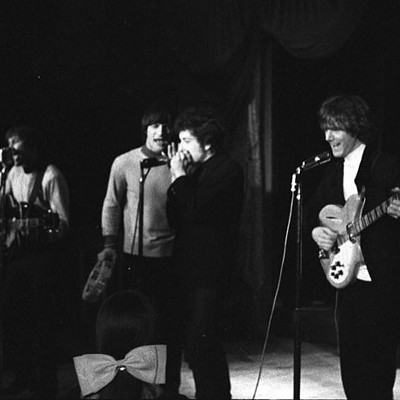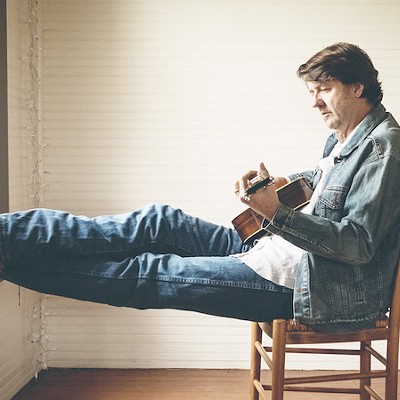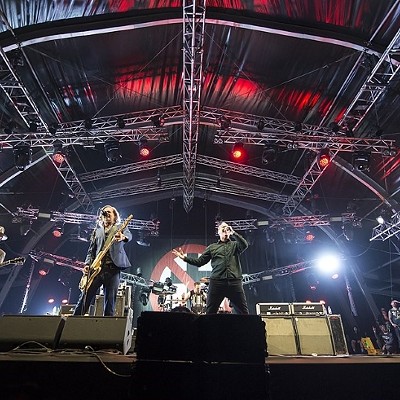To many, the term "Riot Grrrl" evokes images of impassioned, barrette-clad girls shrieking into microphones, the word "SLUT" scrawled across their bare bellies in magic marker.
Those images are mostly accurate -- but more notably, the Riot Grrrl movement of the early '90s carries a passionate story of grassroots feminist activism.
Bands like Bikini Kill, Heavens to Betsy and Bratmobile have preserved the essence of the era musically, but, as any true Riot Grrrl will tell you, there is oh-so-much more to the story than the recordings its key players produced. Thanks to writers like Girls to the Front author Sara Marcus, the movement is finally receiving thorough appreciation.
In anticipation of her reading tonight at the University of Houston, we spoke with Marcus about Girls to the Front, her Riot Grrrl roots, and the driving force behind one of the most radical and emotionally charged feminist eras in history.
Rocks Off: How did you first hear about Riot Grrrl?
Sara Marcus: My first intimation of Riot Grrrl stemmed from this (1992) Newsweek article I read in my sophomore year of high school. I was living in a suburb of Washington, D.C., where it often felt like I wasn't in the center of things culturally.
RO: What part of that Newsweek article spoke to you?
SM: It all blew my mind, because it described these young women who were fighting sexual harassment and playing rock music, which resonated with me. It gave me inspiration to act on my feminist impulses and find these women.
RO: How did you incorporate Riot Grrrl into your life at that point?
SM: I started a feminist club at my high school, and my friend and I started a zine. I got in touch with Riot Grrrl people through an article in a feminist newspaper, and I started going to meetings.
RO: Do you think it has become harder or easier for today's young feminists to connect with one another?
SM: I think the ability to find one another is now greatly enhanced. If you're a young person nowadays, and you think, "I'm a feminist and I don't know any other feminists at my school," you just tap a few things into your computer and get connected with groups, blogs, and Facebook communities.
But I believe there is still value to bodies being together; the power of the Internet to connect people can only be fully realized if we recognize that its opportunities online are the not the endpoint, but rather the means to start a community to group in real-time.
RO: There's something about the roots of Riot Grrrl and the '90s era that seems so romantic.
SM: Of course. In the '90s, we communicated through means that carried great emotional charge -- handwritten letters, trips to meet each other... We didn't even talk on the phone much, because it was so expensive.
Instead, we wrote letters, which have a personal stamp on them in a way that today's emails do not: They were hand-written, or typed on your personal typewriter, and we'd decorate the envelope and add a mix-tape, you know?
But I don't think the Internet has removed our capability to connect in deep ways. I think we just need to be conscious that the Internet is not going to do all that for us. We have to put in the added effort to make these connections meaningful.
RO: What moved you to write Girls to the Front?
SM: I felt like the Riot Grrrl story was going down in history partially. While writing about music for various magazines, I noticed Riot Grrrl was being remembered as a musical genre.
It was a time when young women's lives and bodies were being used as political footballs on a national level -- and no one was telling that story; it had been completely lost. I had this strong feeling of needing to put this history of grassroots feminist activism back on the map with Girls to the Front.
RO: Why do you think that message became overlooked?
SM: In part, I think some of the people involved in Riot Grrrl had been so burned by the media; they were put off by telling their story. I also think it was because whatever young women do isn't taken seriously and isn't preserved.
RO: Will you write another book?
SM: Definitely. I don't know exactly what about yet, though I'm looking into the history of women writer-activists in the 20th century, and seeing what their stories have to tell us about politics, literature, and art.
RO: What can we expect at your reading on Tuesday?
SM: My events turn into big group discussions about what people think is important to discuss and act on in the present day, and aspects of Riot Grrrl. I'll probably do some readings, but in the end, it's really the audience's show.
RO: Meanwhile, where do you recommend young feminists go to learn about activism and feminist history?
SM: There are amazing feminist blogs, like Feministing, The F Bomb, Jezebel, and The Hairpin.
I would suggest reading Adrienne Rich, Audre Lorde and Ellen Willis. It's important to keep in touch with our history, and to read poetry and essays, and not just read blogs. Instead, read what people came up with when they gave themselves the time to think more broadly.
RO: Lastly, which songs would you suggest to readers new to Riot Grrrl -- songs that truly captured the essence and message of the era?
SM: "Double Dare Ya" by Bikini Kill, "P.R.D.C.T." by Bratmobile, and "Her Jazz" by Huggy Bear.
Then, I'd suggest they go jump up and down, and, I don't know, go throw graffiti on something sexist or something!
Marcus' reading, presented by Girls Rock Camp Houston and UH Women's Resource Center, is tonight at 7:30 PM, in Cemo Hall at U of H. Admission is free.
Follow Rocks Off on Facebook and on Twitter at @HPRocksOff.





